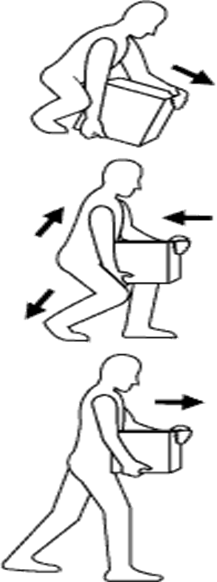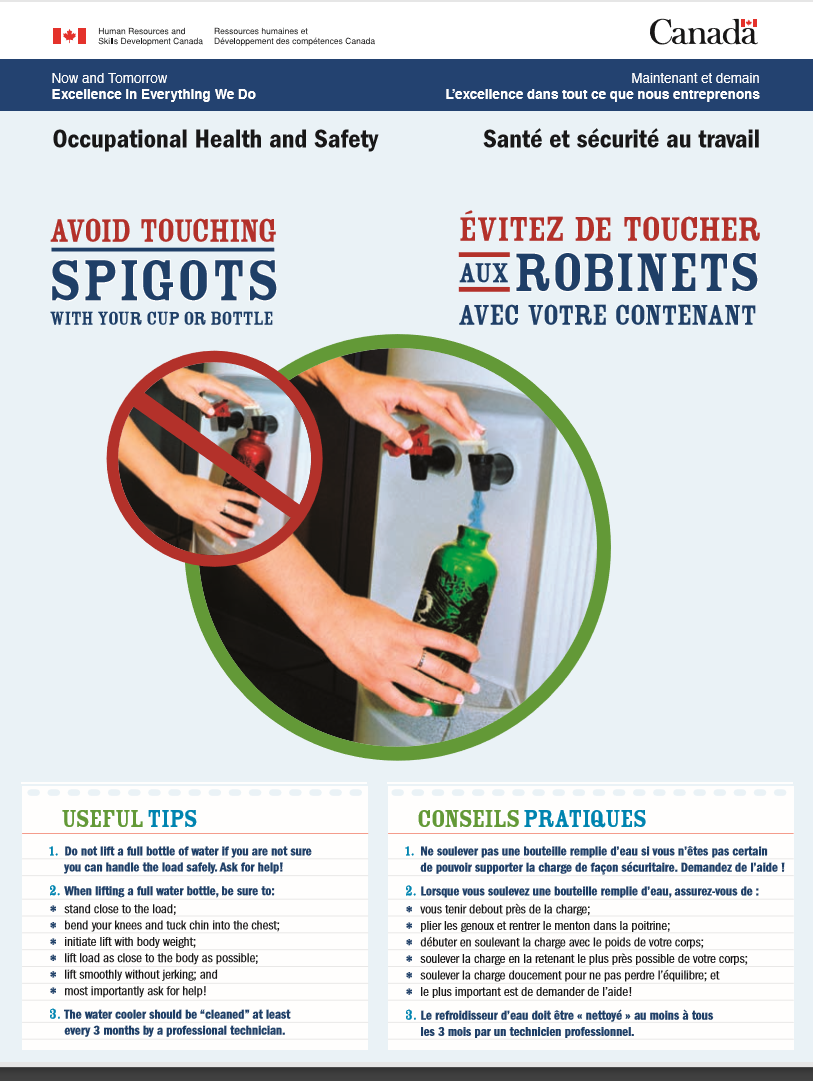Occupational Health and Safety (OHS) Guidelines on the Provision of the Bottled Water and Maintenance of Water Coolers
Version 1.3
October 2019
Departmental OHS Program
1. About Potable Water
1. About Potable Water
Under section 9.24 of the Canada Occupational Health and Safety Regulations, Part II, Canada Labour Code, the Employer is responsible for providing potable water for drinking, personal washing and food preparation that meets the standards set out in Guidelines for Canadian Drinking Water Quality, published by Health Canada.
The potable water supply to workplaces within Employment and Social Development Canada is generally provided by the local municipality and is tested and monitored by qualified technicians on a regular basis.
The department strongly promotes the use of the building's potable water distribution system (water fountains and kitchen taps) as the recommended source for potable water in the workplace.
In cases where building's potable water is not available to employees, it remains the Employer's duty as stated in paragraph125.(1)(j) of the Canada Labour Code, Part II, to provide potable water. This can be achieved by providing water coolers and / or bottled water.
2. Guidelines
2. Guidelines
The Occupational Health and Safety (OHS) Guidelines on the Provision of Bottled Water and Maintenance of Water Coolers (the guidelines) have been developed to ensure that when bottled water is provided or available in the workplace that the following are in place:
- Proper storage techniques;
- Proper handling techniques;
- Proper maintenance program; and
- Proper monitoring measures.
3. General Information
3. General Information
3.1. Scope
3.1. Scope
The guidelines apply to all work locations and all employees within the Department, including Service Canada, the Labour Program and all other service offerings managed within ESDC, as well as every person granted access to the workplace.
Effective Date
The guidelines came into effect on May 5, 2009.
3.2. Review Date
3.2. Review Date
The guidelines will be reviewed every five years from its date of implementation, or as required, to ensure consistency with changes to legislation, regulations, and Treasury Board Secretariat / National Joint Council Directives.
Last Review Date
Next Review Date
Review Completed by:
2014
2019
COHSO
2019
2024
COHSO
4. Interpretations & Definitions
4. Interpretations & Definitions
Bottled water (eau potable embouteillée): potable water kept in a sealed container or package and sold for human consumption and other consumption uses.
Employee (employé): a person employed by an employer.
Employer (employeur): a person who employs one or more employees and includes an employer's organization and any person who acts on behalf of an employer.
Health and Safety Representative (représentant en matière de santé et de sécurité): a person who is appointed as a health and safety representative under section 136 of the Canada Labour Code, Part II.
Maintenance (entretien): all actions taken to retain material in or to restore it to a specified condition including inspection, testing, cleaning and repair.
Management (gestion): any person who acts in a supervisory or managerial capacity who has delegated authority in accordance with Financial Administration Act.
Potable water (eau potable): water whose quality meets Health Canada's drinking water standards and requirements.
Water cooler (fontaine réfrigérante): device used to dispense bottled water.
Workplace Health and Safety Committee (comité local de santé et de sécurité): a workplace health and safety committee established under section 135 of the Canada Labour Code, Part II.
5. Bottled Water Storage
5. Bottled Water Storage
Improper storage of bottled water, such as leaving water bottles in the sunlight and inadequate sterilization and cleaning of water coolers, can lead to the formation of algae and the growth of bacteria, which can cause health problems.
To ensure the quality of bottled water, bottles must be stored in a cool, dry place, in a room where no chemical products are kept. It is recommended that the number of bottles stored in workspaces be kept to a minimum. Bottles must be kept in a storage area or delivered on request.
6. Handling of Bottled Water
6. Handling of Bottled Water
Proper techniques must be used when handling or lifting water bottles. Whenever a bottle needs to be moved or replaced, the task should be completed by a person who is familiar with the proper technique to safely lift and handle heavy objects. The individual who will be completing this task should be informed on Proper Lifting Techniques (Annex A).
Annex A should be posted near every water cooler as a reminder to use proper lifting techniques. Take note that a full 18-liter container of bottled water weighs approximately 21 Kilograms (45 pounds).
Annex B should be posted near water coolers to raise awareness on avoiding touching the spigots.
7. Maintenance of Water Coolers
7. Maintenance of Water Coolers
Agreements with bottled water suppliers for the delivery of services in the workplace must include regular maintenance of the water coolers and parts thereof. It is recommended that maintenance and cleaning be done at least every 3 months or more frequently depending on the use or other special circumstances.
The people arranging the contract should ask for the company's cleaning procedures and keep this information on file. Records of the cleaning frequency should also be documented. An example of the Maintenance Tracking Sheet can be found in Annex C. Also, most companies can provide a "stick on" maintenance tracking sheet for quick reference.
To ensure that water coolers are maintained, the Workplace Health and Safety Committee (or the Health and Safety Representative) should add this item to their monthly inspection check list.
8. Responsibilities
8. Responsibilities
8.1. Employer Representatives
8.1. Employer Representatives
(Employer … encompasses all senior management officials, directors, managers, team leaders, supervisors, management leads, and site leads)
The employer representative should:
- Follow procedures in these guidelines with respect to the storage and handling of bottled water and the maintenance of water coolers.
- Ensure that bottled water service contracts include regular maintenance of water coolers.
- Ensure that water coolers do not cause safety problems in the workplace and that all codes and regulations governing premises configuration are observed.
8.2. Employees
8.2. Employees
Employees should:
- Follow procedures in these guidelines with respect to the storage and handling of bottled water.
- Report to management any safety problems in the workplace related to bottled water and water coolers.
- Inform management when an injury has occurred while handling bottled water and/or water coolers.
8.3. Workplace Health and Safety Committee / Health and Safety Representative (WHSC / HSR)
8.3. Workplace Health and Safety Committee / Health and Safety Representative (WHSC / HSR)
Workplace Health and Safety Committee or Health and Safety Representative should:
- Provide information to employees and management concerning bottled water handling techniques.
- Ensure during monthly workplace inspection that water coolers are maintained and that appropriate information is posted.
- Make recommendations to local management in regard of the use or the removal of water coolers.
8.4. Regional Occupational Health and Safety Advisor (ROHSA)
8.4. Regional Occupational Health and Safety Advisor (ROHSA)
Regional Occupational Health and Safety Advisors should:
- Provide employees and local and regional management with guidance and information regarding these guidelines.
9. Record Management
9. Record Management
All documents relating to transactions with the supplier(s) – for example, billing, files on maintenance contracts and water quality reports provided by producers – must be maintained and available for review.
These documents must be filed in accordance with the records management policy of the Department.
Annex A – Proper Lifting Techniques
Annex A – Proper Lifting Techniques
What should you do before lifting?
- Assess/ identify the weight of the load.
- Be sure that you can lift the load without over-exertion.
- Be sure that the load is "free" to move.
- Check that the planned location of the load is free of obstacles and debris.
- Be sure that the path to the planned location of the load is clear. Grease, oil, water, litter and debris can cause slips and falls.
- Do not lift if you are not sure that you can handle the load safely.
What are some general tips for lifting?
- Prepare for the lift by warming up the muscles.
- Stand close to the load and face the way you intend to move.
- Use a wide stance to help you gain balance.
- Be sure you have a good grip on the load.
- Keep arms straight.
- Tighten abdominal muscles.
- Tuck chin into the chest.
- Initiate the lift with body weight.
- Lift the load as close to the body as possible.
- Lift smoothly without jerking.
- Avoid twisting and side bending while lifting.

Source: Canadian Centre for Occupational Health and Safety (ccohs.ca)
Annex B – Poster
Annex B – Poster

Long Description
Occupational Health and Safety
Avoid touching spigots with your cup or bottle
Useful tips
- Do not lift a full bottle of water if you are not sure you can handle the load safely. Ask for help!
- When lifting a full water bottle, be sure to:
- stand close to the load;
- bend your knees and tuck chin into the chest;
- initiate lift with body weight;
- lift load as close to the body as possible;
- lift smoothly without jerking; and
- most importantly ask for help!
- The water cooler should be "cleaned" at least every 3 months by a professional technician.
Annex C – Maintenance Tracking Sheet
Annex C – Maintenance Tracking Sheet
Workplace: Location of water cooler: Name of cleaning/maintenance provider: Contact information: Please complete this table when providing service maintenance.
Date Name of Service Provider Date Name of Service Provider If you notice anything dysfunctional, please contact your supplier.
The Departmental recommends that maintenance and cleaning of the water coolers be part of the contract agreement with suppliers and be done at least every 3 months or more frequently depending on the use or other special circumstances.